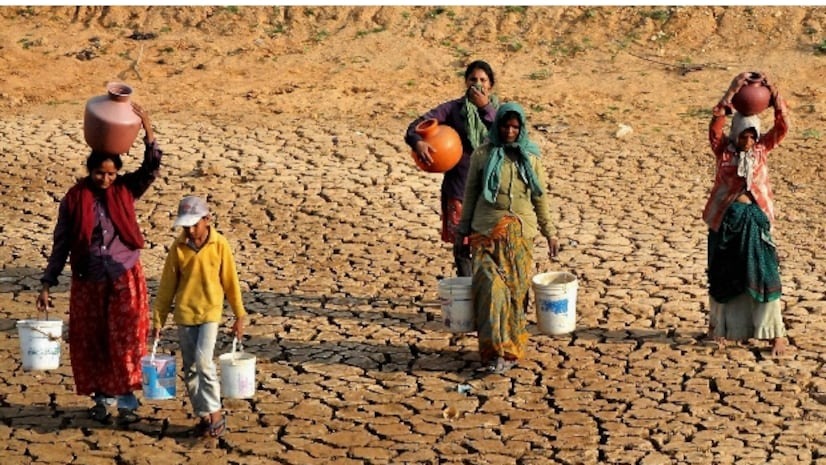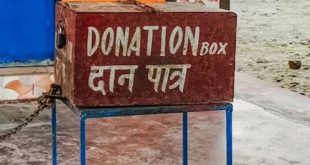 Water Crisis in Rajasthan: The Indian Institute of Science has warned that if some cities in India continue to mismanage their water supply, they may soon face a situation worse than the South African city of Cape Town. The South African city of Cape Town faced severe water shortage between 2015 and 2018. This situation arose in Cape Town due to less than average rainfall for a long time. Due to less rainfall, Cape Town faced drought. As a result, the water level in the reservoirs of Cape Town went down significantly. In March 2023, Bengaluru, the city famous as Silicon Valley of India, had to face severe water shortage.
Water Crisis in Rajasthan: The Indian Institute of Science has warned that if some cities in India continue to mismanage their water supply, they may soon face a situation worse than the South African city of Cape Town. The South African city of Cape Town faced severe water shortage between 2015 and 2018. This situation arose in Cape Town due to less than average rainfall for a long time. Due to less rainfall, Cape Town faced drought. As a result, the water level in the reservoirs of Cape Town went down significantly. In March 2023, Bengaluru, the city famous as Silicon Valley of India, had to face severe water shortage.
What is the Cape Town water crisis?
The South African city of Cape Town faced severe water shortages between 2015 and 2018. The main reason for this was the low level of water in the city’s reservoirs. The water level had fallen so low that the city’s water supply could have been completely cut off. Authorities were forced to implement strict water-rationing measures.
The situation in Cape Town had become so serious that there were fears of Day Zero. The entire Western Cape Town was hit by drought. However, things started to improve after September 2018 and by 2020 the water supply became normal.
Reasons for water shortage in Bangalore
The main reason for water crisis in Bangalore is less rainfall in the Cauvery basin. 60 percent of the city’s total water supply comes from the Cauvery basin. But due to less rainfall, the groundwater level has reached a low level. Like Cape Town, the water level of Bangalore is also at its lowest level. This can also be understood in this way that when there was a water crisis in Cape Town, the Theewaterskloof dam of Cape Town was filled only to 11.3 percent of its capacity. This canal was the only major source of water for the city of Cape Town. Similarly, the KRS dam of Bangalore is filled to less than 28 percent of its capacity.
Karnataka Deputy Chief Minister DK Shivakumar says that out of 13,900 government borewells in the city, 6900 have dried up. Many places in the city are completely dependent on water tankers to meet their water needs.
There may be water shortage in these districts of Rajasthan
According to the report of the Ground Water Department, by next year i.e. 2025, there will be no water left in all the big cities of Rajasthan including Jaipur, Ajmer, Jodhpur. In Rajasthan, 5.49 billion cubic meters more water is being used every year than the water recharged from rain and other sources. That means the savings of the future are being spent today itself.
In the dynamic ground water resource report of the Central Ground Water Board and the Ground Water Department of Rajasthan, the availability of water in Jaipur, Ajmer, Jaisalmer and Jodhpur has been estimated to be zero. The current situation is also not good. Chief Engineer of the Ground Water Department, Suraj Bhan Singh, says that the situation is quite frightening. The water crisis will become more serious in the coming days.
Consumption is more than storage
By 2025, the dynamic resources of groundwater in these cities of Rajasthan will become zero. That is, we are extracting more water from the ground than the amount of water being stored in these cities. Due to this, 219 out of 302 blocks of Rajasthan have gone far above the danger mark. These have been placed in the category of overexploitation. Out of the remaining, 22 are in the critical category and 20 are in the semi-critical category. Only 38 blocks have been declared safe in terms of water availability.
situation getting serious
According to the groundwater survey report, the situation in Rajasthan has changed completely in the last 40 years. In 1984, out of 236 blocks in Rajasthan, 203 were safe for drinking. Only 10 were semi-critical, 11 critical and 12 were over-exploited. At that time, only 35.75% of the water recharged in Rajasthan was used. But in 2023, 148.77% of the recharged water is being consumed.
Why is this situation arising?
Apart from less rainfall, rapid and unplanned urbanization is a major cause of water crisis. As the city expands, there are problems in managing the demand of water supply infrastructure i.e. reservoirs, pipelines and plants. Due to this, water leakage and other problems start.
 Suspense Crime Sach Ka Dam
Suspense Crime Sach Ka Dam


